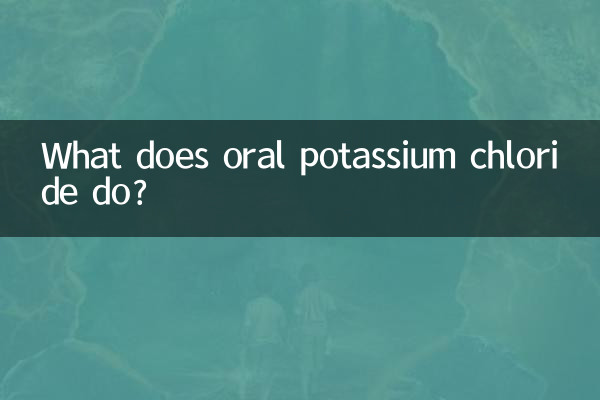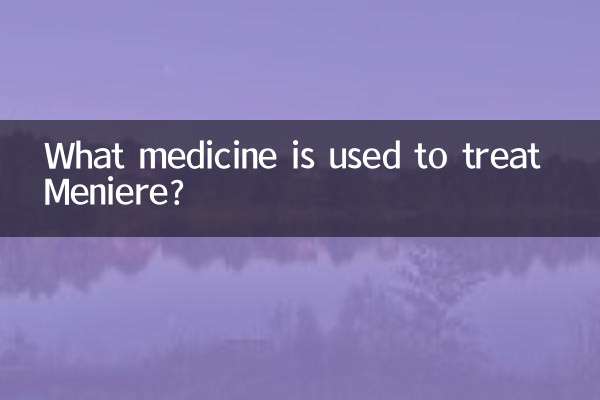What does oral potassium chloride do?
In recent years, health topics have continued to receive attention, especially discussions related to electrolyte balance. Potassium chloride is a common electrolyte supplement, and its oral uses and precautions have become one of the hot topics recently. This article will combine the hot content of the entire Internet in the past 10 days to introduce in detail the role of oral potassium chloride, applicable groups and precautions, and present relevant information in structured data.
1. Main functions of oral potassium chloride

Potassium chloride is an inorganic compound mainly used to supplement the potassium ions needed by the human body. Potassium is an important electrolyte for maintaining cell function, nerve conduction, and muscle contraction. The following are the main uses of oral potassium chloride:
| function | Description |
|---|---|
| correct hypokalemia | Indicated for potassium deficiency due to diarrhea, vomiting or diuretic use |
| Maintain heart function | Potassium ions are essential for the electrical activity of the heart muscle, and deficiency may lead to arrhythmias. |
| Regulate blood pressure | Appropriate potassium supplementation can help reduce the risk of high blood pressure |
| Support muscle function | Prevent muscle weakness and cramps |
2. Applicable groups and contraindications
According to recent medical discussions, oral potassium chloride is not suitable for everyone. The following is a summary of applicable groups and contraindications:
| Classification | Detailed description |
|---|---|
| Applicable people | 1. Patients with hypokalemia 2. People who take diuretics for a long time 3. Patients with severe diarrhea or vomiting 4. Certain patients with high blood pressure (doctor’s guidance is required) |
| Taboo groups | 1. Patients with hyperkalemia 2. Patients with severe renal insufficiency 3. Patients with acute dehydration 4. People with adrenal insufficiency |
3. Recent hot topics of discussion
In the past 10 days, discussions about oral potassium chloride have mainly focused on the following aspects:
| topic | heat index | Main point |
|---|---|---|
| Potassium supplement after exercise | 85% | Experts recommend supplementing potassium through food after strenuous exercise and not taking potassium chloride directly unless necessary. |
| relationship with hypertension | 78% | Research shows that appropriate amounts of potassium supplementation may help lower blood pressure, but individualized assessment is required |
| Side Effect Warning | 92% | Excessive potassium supplementation may cause arrhythmia, so please strictly follow your doctor’s advice |
4. Precautions for use
According to recent medical guideline updates, the following precautions should be taken when taking potassium chloride orally:
1.dose control: The daily potassium requirement for adults is 2000-4000mg, and the supplementary dose needs to be adjusted according to the blood potassium level.
2.How to take: Should be taken with or after meals to reduce gastrointestinal irritation.
3.Monitoring indicators: Check blood potassium levels and kidney function regularly.
4.drug interactions: Caution is required when combined with ACEI antihypertensive drugs and potassium-sparing diuretics.
5. Alternatives to natural potassium supplementation
In recent health topics, many experts recommend supplementing potassium through diet as a priority. Here is a list of foods high in potassium:
| food category | represents food | Potassium content per 100g (mg) |
|---|---|---|
| fruit | Banana, orange, cantaloupe | 300-500 |
| vegetables | Spinach, potatoes, mushrooms | 400-600 |
| nuts | almonds, peanuts | 700-1000 |
Conclusion
Oral potassium chloride plays an important role in correcting electrolyte imbalances but must be used strictly as directed by your doctor. Recent discussions have emphasized that for those with mild potassium deficiency, supplementation through dietary adjustment is preferred. Whether it is potassium supplementation with drugs or food, maintaining a balance of potassium and sodium is the key to maintaining health. It is recommended that the public seek medical advice promptly instead of self-medicating when symptoms of suspected hypokalemia occur.

check the details

check the details